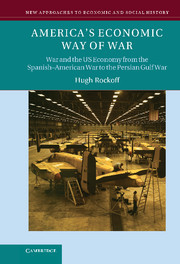 America's Economic Way of War
America's Economic Way of War Book contents
- Frontmatter
- Contents
- Figures
- Boxes
- Tables
- Chronologies
- Acknowledgements
- 1 A century of war
- 2 The economics of war
- 3 The Spanish–American War
- 4 The Philippine–American War
- 5 World War I
- 6 World War II
- 7 The Korean War
- 8 The Cold War
- 9 The Vietnam War
- 10 The Persian Gulf War
- 11 The American economic way of war
- Appendix Appendices
- References
- Index
1 - A century of war
Published online by Cambridge University Press: 05 June 2012
- Frontmatter
- Contents
- Figures
- Boxes
- Tables
- Chronologies
- Acknowledgements
- 1 A century of war
- 2 The economics of war
- 3 The Spanish–American War
- 4 The Philippine–American War
- 5 World War I
- 6 World War II
- 7 The Korean War
- 8 The Cold War
- 9 The Vietnam War
- 10 The Persian Gulf War
- 11 The American economic way of war
- Appendix Appendices
- References
- Index
Summary
The sinews of war are infinite money.
Roman statesman and philosopher, CiceroThis book is about the economic causes and consequences of the wars that the United States fought in the twentieth century. Although the general public and professional historians focus considerable attention on wars, economists tend to neglect them. To be sure, there is a small group of economic historians who have diligently worked to increase our knowledge of the economics of war – one of the purposes of this book is to bring their findings to the attention of a larger audience – but it is fair to say that economists as a whole tend to think of peace as the norm and war as an exception to be ignored. But the idea that war can be regarded as a rare outlier belies the truth: America was at war somewhere in the world during a significant portion of the twentieth century.
The wars that opened the century, the Spanish–American and Philippine–American wars, required relatively small fractions of the nation's resources. The two world wars that followed required much larger fractions, and brought in their train far-reaching networks of government control. The post-World War II conflicts in Korea, Vietnam, and Iraq again were “limited wars,” similar to the wars that opened the century, rather than to the world wars. Indeed, there is a sense in which we have come full circle: the wars which America is now fighting in Iraq and Afghanistan bear a strong and often unsettling likeness to the Spanish–American and Philippine–American wars. Each war presented unique military, political, and economic challenges, but there were many common elements. In this volume I will try to summarize these elements by answering some of the most familiar questions about the economics of America's wars, starting with questions about how the country got into the wars, moving on to questions about how they were fought, and ending with questions about their legacies. The answers to most of these questions cannot be laid down with certainty. In this chapter I will provide only a few facts to illustrate the nature of the issue and to suggest my main conclusion. Hopefully, the discussions of individual wars in subsequent chapters will provide more compelling evidence.
- Type
- Chapter
- Information
- America's Economic Way of WarWar and the US Economy from the Spanish-American War to the Persian Gulf War, pp. 1 - 12Publisher: Cambridge University PressPrint publication year: 2012
